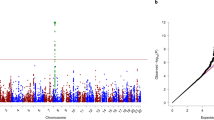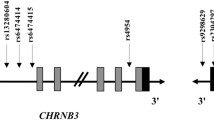Abstract
Genome-wide studies provide increasing evidence of association of genetic variants with different behaviors. However, there is a growing need for replication and subsequent characterization of specific findings. In this sense, the CHRNA5 gene has been associated with nicotine (with genome-wide significance), alcohol and cocaine addictions. So far, this gene has not been evaluated in smoked (crack) cocaine. We aimed to analyze the influence of CHRNA5 variants in crack addiction susceptibility and severity. The sample includes 300 crack-addicted patients and 769 non-addicted individuals. The CHRNA5 SNPs evaluated were rs588765, rs16969968, and rs514743. Homozygosity for rs16969968 and rs588765 major alleles was nominally associated with a risk to crack addiction (GG, P = 0.032; CC, P = 0.036, respectively). Haplotype analyses reveal significant associations (rs588765|rs16969968|rs514743 pglobal-corrected = 7.66 × 10–5) and suggest a substantial role for rs16969968. These findings corroborate previous reports in cocaine addiction—in line with the expected effects of cocaine in the cholinergic system—and in the opposite direction of significant GWAS findings for nicotine addiction susceptibility. These results are strengthened by the first report of an association of rs588765 with crack addiction and by the haplotype findings. In summary, our study highlights the relevance of the α5 subunit on crack cocaine addiction, replicating previous results relating CHRNA5 with the genetics and pathophysiology of addiction of different drugs.
Similar content being viewed by others
References
Adzhubei, I. A., Schmidt, S., Peshkin, L., Ramensky, V. E., Gerasimova, A., Bork, P., et al. (2010). A method and server for predicting damaging missense mutations. Nature Methods, 7(4), 248–249. https://doi.org/10.1038/nmeth0410-248.
Albuquerque, E. X., Pereira, E. F. R., Alkondon, M., & Rogers, S. W. (2009). Mammalian nicotinic acetylcholine receptors: From structure to function. Physiological Reviews, 89(1), 73–120. https://doi.org/10.1152/physrev.00015.2008.
American Psychiatric Association. (1994). Diagnostic and statistical manual of mental disorders: DSM-IV-TR®. American Psychiatric Association (4th ed.). Washington, D.C.: American Psychiatric Press. https://doi.org/10.1176/appi.books.9780890423349
Barrie, E. S., Hartmann, K., Lee, S.-H., Frater, J. T., Seweryn, M., Wang, D., et al. (2017). The CHRNA5/CHRNA3/CHRNB4 nicotinic receptor regulome: Genomic architecture, regulatory variants, and clinical associations. Human Mutation, 38(1), 112–119. https://doi.org/10.1002/humu.23135.
Bierut, L. J., Stitzel, J. A., Wang, J. C., Hinrichs, A. L., Grucza, R. A., Xuei, X., et al. (2008). Variants in the nicotinic receptors alter the risk for nicotine dependence. American Journal of Psychiatry, 165(September), 1163–1171. https://doi.org/10.1176/appi.ajp.2008.07111711.Variants.
Boyle, A. P., Hong, E. L., Hariharan, M., Cheng, Y., Schaub, M. A., Kasowski, M., et al. (2012). Annotation of functional variation in personal genomes using RegulomeDB. Genome Research, 22(9), 1790–1797. https://doi.org/10.1101/gr.137323.112.
Brown, R. W. B., Collins, A. C., Lindstrom, J. M., & Whiteaker, P. (2007). Nicotinic alpha5 subunit deletion locally reduces high-affinity agonist activation without altering nicotinic receptor numbers. Journal of Neurochemistry, 103(1), 204–215. https://doi.org/10.1111/j.1471-4159.2007.04700.x.
Bühler, K.-M., Giné, E., Echeverry-Alzate, V., Calleja-Conde, J., de Fonseca, F. R., & López-Moreno, J. A. (2015). Common single nucleotide variants underlying drug addiction: More than a decade of research. Addiction Biology, 20(5), 845–871. https://doi.org/10.1111/adb.12204.
Cacciola, J. S., Alterman, A. I., Habing, B., & McLellan, A. T. (2011). Recent status scores for version 6 of the Addiction Severity Index (ASI-6). Addiction, 106(9), 1588–1602. https://doi.org/10.1111/j.1360-0443.2011.03482.x.
Chen, B. T., Bowers, M. S., Martin, M., Hopf, F. W., Guillory, A. M., Carelli, R. M., et al. (2008). Cocaine but not natural reward self-administration nor passive cocaine infusion produces persistent LTP in the VTA. Neuron, 59(2), 288–297. https://doi.org/10.1016/j.neuron.2008.05.024.
Choi, Y., & Chan, A. P. (2015). PROVEAN web server: A tool to predict the functional effect of amino acid substitutions and indels. Bioinformatics, 31(16), 2745–2747. https://doi.org/10.1093/bioinformatics/btv195.
First, M. B., Spitzer, R. L., Gibbon, M., & Williams, J. B. W. (2002). Structured Clinical Interview for DSM-IV-TR Axis I Disorders, Patient Edition (SCID-I/P, 11/2002 revision) for DSMIV.
Grucza, R. A., Wang, J. C., Stitzel, J. A., Hinrichs, A. L., Saccone, S. F., Saccone, N. L., et al. (2008). A risk allele for nicotine dependence in CHRNA5 is a protective allele for cocaine dependence. Biological Psychiatry, 64(11), 922–929. https://doi.org/10.1016/j.biopsych.2008.04.018.
Haller, G., Kapoor, M., Budde, J., Xuei, X., Edenberg, H., Nurnberger, J., et al. (2014). Rare missense variants in CHRNB3 and CHRNA3 are associated with risk of alcohol and cocaine dependence. Human Molecular Genetics, 23(3), 810–819. https://doi.org/10.1093/hmg/ddt463.
Hällfors, J., Loukola, A., Pitkäniemi, J., Broms, U., Männistö, S., Salomaa, V., et al. (2013). Scrutiny of the CHRNA5-CHRNA3-CHRNB4 smoking behavior locus reveals a novel association with alcohol use in a Finnish population based study. International Journal of Molecular Epidemiology and Genetics, 4(2), 109–119.
Hancock, D. B., Guo, Y., Reginsson, G. W., Gaddis, N. C., Lutz, S. M., Sherva, R., et al. (2018). Genome-wide association study across European and African American ancestries identifies a SNP in DNMT3B contributing to nicotine dependence. Molecular Psychiatry, 23(9), 1–9. https://doi.org/10.1038/mp.2017.193.
Horwitz, T., Lam, K., Chen, Y., Xia, Y., & Liu, C. (2018). A decade in psychiatric GWAS research. Molecular Psychiatry, 24(3), 1–12. https://doi.org/10.1038/s41380-018-0055-z.
Kaneda, K. (2018). Neuroplasticity in cholinergic neurons of the laterodorsal tegmental nucleus contributes to the development of cocaine addiction. European Journal of Neuroscience. https://doi.org/10.1111/ejn.13962.
Kessler, F., Cacciola, J., Alterman, A., Faller, S., Souza-Formigoni, M. L., Cruz, M. S., et al. (2012). Psychometric properties of the sixth version of the Addiction Severity Index (ASI-6) in Brazil. Revista Brasileira de Psiquiatria, 34(1), 24–33. https://doi.org/10.1590/S1516-44462012000100006.
Kumar, P., Henikoff, S., & Ng, P. C. (2009). Predicting the effects of coding non-synonymous variants on protein function using the SIFT algorithm. Nature Protocols, 4(7), 1073–1081. https://doi.org/10.1038/nprot.2009.86.
Kuryatov, A., Berrettini, W., & Lindstrom, J. (2011). Acetylcholine receptor (AChR) α5 subunit variant associated with risk for nicotine dependence and lung cancer reduces (α4β2)2α5 AChR function. Molecular Pharmacology, 79(1), 119–125. https://doi.org/10.1124/mol.110.066357.
Lahiri, D. K., & Nurnberger, J. I. (1991). A rapid no-enzymatic method for the preparation of HMW DNA from blood for RFLP analysis. Nucleic Acids Research, 19(19), 5444. https://doi.org/10.1093/nar/19.19.5444.
Lubke, G. H., Stephens, S. H., Lessem, J. M., Hewitt, J. K., & Ehringer, M. A. (2012). The CHRNA5/A3/B4 gene cluster and tobacco, alcohol, cannabis, inhalants and other substance use initiation: Replication and new findings using mixture analyses. Behavior Genetics, 42(4), 636–646. https://doi.org/10.1007/s10519-012-9529-y.
McGranahan, T. M., Patzlaff, N. E., Grady, S. R., Heinemann, S. F., & Booker, T. K. (2011). α4β2 nicotinic acetylcholine receptors on dopaminergic neurons mediate nicotine reward and anxiety relief. The Journal of Neuroscience: The Official Journal of the Society for Neuroscience, 31(30), 10891–10902. https://doi.org/10.1523/JNEUROSCI.0937-11.2011.
Pandey, N., Pal, S., Sharma, L. K., Guleria, R., Mohan, A., & Srivastava, T. (2017). SNP rs16969968 as a strong predictor of nicotine dependence and lung cancer risk in a North Indian Population. Asian Pacific Journal of Cancer Prevention: APJCP, 18(11), 3073–3079. https://doi.org/10.22034/APJCP.2017.18.11.3073.
Polina, E. R., Rovaris, D. L., de Azeredo, L. A., Mota, N. R., Vitola, E. S., Silva, K. L., et al. (2014). ADHD diagnosis may influence the association between polymorphisms in nicotinic acetylcholine receptor genes and tobacco smoking. Neuromolecular Medicine, 16, 389–397. https://doi.org/10.1007/s12017-013-8286-2.
Purcell, S., Neale, B., Todd-Brown, K., Thomas, L., Ferreira, M. A., Bender, D., et al. (2007). PLINK: A tool set for whole-genome association and population-based linkage analyses. American Journal of Human Genetics, 81(3), 559–575. https://doi.org/10.1086/519795.
Rovaris, D. L., Schuch, J. B., Grassi-Oliveira, R., Sanvicente-Vieira, B., da Silva, B. S., Walss-Bass, C., et al. (2017). Effects of crack cocaine addiction and stress-related genes on peripheral BDNF levels. Journal of Psychiatric Research. https://doi.org/10.1016/j.jpsychires.2017.02.011.
Saccone, N. L., Emery, L. S., Sofer, T., Gogarten, S. M., Becker, D. M., Bottinger, E. P., et al. (2018). Genome-wide association study of heavy smoking and daily/nondaily smoking in the hispanic community health study/study of latinos (HCHS/SOL). Nicotine & Tobacco Research: Official Journal of the Society for Research on Nicotine and Tobacco, 20(4), 448–457. https://doi.org/10.1093/ntr/ntx107.
Saccone, N. L., Saccone, S. F., Goate, A. M., Grucza, R. A., Hinrichs, A. L., Rice, J. P., et al. (2008). In search of causal variants: Refining disease association signals using cross-population contrasts. BMC Genetics, 9(1), 58. https://doi.org/10.1186/1471-2156-9-58.
Sherva, R., Kranzler, H. R., Yu, Y., Logue, M. W., Poling, J., Arias, A. J., et al. (2010). Variation in nicotinic acetylcholine receptor genes is associated with multiple substance dependence phenotypes. Neuropsychopharmacology, 35(9), 1921–1931. https://doi.org/10.1038/npp.2010.64.
Stolf, A. R., Szobot, C. M., Halpern, R., Akutagava-Martins, G. C., Müller, D., Guimaraes, L. S. P., et al. (2014). Crack cocaine users show differences in genotype frequencies of the 3’ UTR variable number of tandem repeats of the dopamine transporter gene (DAT1/SLC6A3). Neuropsychobiology, 70(1), 44–51. https://doi.org/10.1159/000365992.
Tapia, L., Kuryatov, A., & Lindstrom, J. (2007). Ca2+ permeability of the (alpha4)3(beta2)2 stoichiometry greatly exceeds that of (alpha4)2(beta2)3 human acetylcholine receptors. Molecular Pharmacology, 71(3), 769–776. https://doi.org/10.1124/mol.106.030445.
The Tobacco and Genetics Consortium, Furberg, H., Kim, Y., Dackor, J., Boerwinkle, E., Franceschini, N., et al. (2010). Genome-wide meta-analyses identify multiple loci associated with smoking behavior. Nature Genetics, 42(5), 441–447. https://doi.org/10.1038/ng.571.
Verebey, K., & Gold, M. S. (1988). From coca leaves to crack: The effects of dose and routes of administration in abuse liability. Psychiatric Annals, 18(9), 513–520. https://doi.org/10.3928/0048-5713-19880901-06.
Volkow, N. D., Wang, G. J., Fischman, M. W., Foltin, R., Fowler, J. S., Franceschi, D., et al. (2000). Effects of route of administration on cocaine induced dopamine transporter blockade in the human brain. Life Sciences, 67(12), 1507–1515.
Wang, J., Cruchaga, C., Saccone, N. L., Bertelsen, S., Liu, P., Budde, J. P., et al. (2009a). Risk for nicotine dependence and lung cancer is conferred by mRNA expression levels and amino acid change in CHRNA5. Human Molecular Genetics, 18(16), 3125–3135. https://doi.org/10.1093/hmg/ddp231.
Wang, J., Grucza, R., Cruchaga, C., Hinrichs, A. L., Bertelsen, S., Budde, J. P., et al. (2009b). Genetic variation in the CHRNA5 gene affects mRNA levels and is associated with risk for alcohol dependence. Molecular Psychiatry, 14(5), 50–510. https://doi.org/10.1002/cncr.29075.Familial.
Ward, L. D., & Kellis, M. (2012). HaploReg: A resource for exploring chromatin states, conservation, and regulatory motif alterations within sets of genetically linked variants. Nucleic Acids Research, 40(D1), D930–D934. https://doi.org/10.1093/nar/gkr917.
Yin, R., & French, E. D. (2000). A comparison of the effects of nicotine on dopamine and non-dopamine neurons in the rat ventral tegmental area: An in vitro electrophysiological study. Brain Research Bulletin, 51(6), 507–514.
You, Z.-B., Wang, B., Zitzman, D., & Wise, R. A. (2008). Acetylcholine release in the mesocorticolimbic dopamine system during cocaine seeking: Conditioned and unconditioned contributions to reward and motivation. The Journal of Neuroscience: The Official Journal of the Society for Neuroscience, 28(36), 9021–9029. https://doi.org/10.1523/JNEUROSCI.0694-08.2008.
Zhang, L., Liu, Y., & Chen, X. (2005). Carbachol induces burst firing of dopamine cells in the ventral tegmental area by promoting calcium entry through L-type channels in the rat. The Journal of Physiology, 568(Pt 2), 469–481. https://doi.org/10.1113/jphysiol.2005.094722.
Acknowledgements
We are thankful to the staff of the participating psychiatric units for all their support with data collection.
Funding
This study was supported by grants from Conselho Nacional de Desenvolvimento Científico e Tecnologico (CNPq, 476529/2012-3, 466722/2014-1, 466802/2014-5 and 424041/2016-2), Coordenação de Aperfeiçoamento Pessoal de Nível Superior (CAPES, Finance Code 001), and Secretaria Nacional de Políticas sobre Drogas (SENAD, 82264/2015) and FIPE-HCPA. Any funding source had participation in the study design; in the collection, analysis and interpretation of data; in the writing of the report; and in the decision to submit the paper for publication.
Author information
Authors and Affiliations
Corresponding author
Ethics declarations
Conflict of interest
EHG was on the speaker's bureau for Novartis and Shire for the last 3 years. He also received travel awards (air tickets and hotel accommodations) for participating in two psychiatric meetings from Shire and Novartis. The remaining authors declare no conflict of interest.
Ethical Approval
This study is in accordance with the Declaration of Helsinki. All participants signed the consent form approved by the participants institutional review boards (IRB).
Additional information
Publisher's Note
Springer Nature remains neutral with regard to jurisdictional claims in published maps and institutional affiliations.
Electronic supplementary material
Below is the link to the electronic supplementary material.
Rights and permissions
About this article
Cite this article
Aroche, A.P., Rovaris, D.L., Grevet, E.H. et al. Association of CHRNA5 Gene Variants with Crack Cocaine Addiction. Neuromol Med 22, 384–390 (2020). https://doi.org/10.1007/s12017-020-08596-1
Received:
Accepted:
Published:
Issue Date:
DOI: https://doi.org/10.1007/s12017-020-08596-1




